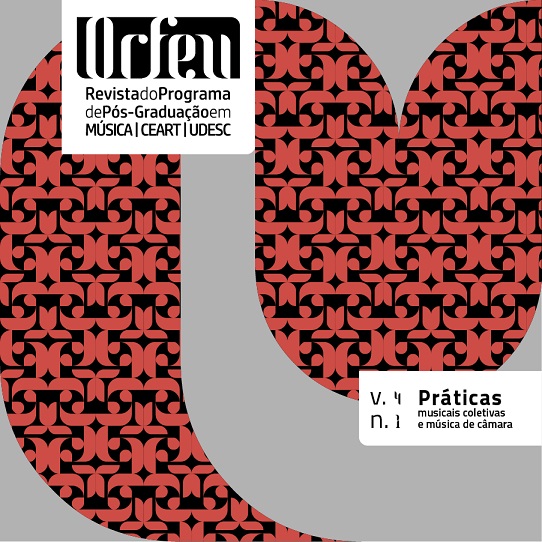As vozes da letra na fonosfera grega: um estudo sobre os cantares da Antiguidade
DOI:
https://doi.org/10.5965/2525530404012019184Palabras clave:
Vocalidade, Gêneros lítero-musicais, Composição auralResumen
A historiografia da Antiguidade grega apresenta música e linguagem intimamente associadas. As fórmulas métricas pressupõem artifícios mnemônicos e indicam a preponderância da dimensão aural das performances sobre a escrita. Haveria características intrínsecas da língua grega que amoldariam as possibilidades melódicas? Ao ser colocada a questão do elo música-palavra, a seguinte rede temática será evidenciada: como se forma a ressonância melódico-textual? De que modo se dá, no canto, a convergência de elementos rítmico-melódicos, semânticos e performáticos? Ora propomos um estudo do elo canto-palavra desde os vestígios de canções gregas notadas com a escrita musical antiga. A problematização das relações entre o ritmo musical, a melodia e a métrica poética põe à mostra possíveis características das inflexões vocálicas como arquétipos específicos de performances e composições. Pela perspectiva da filosofia humanista da música (LIPPMAN, 2006), entende-se a vocalidade grega como um rito. A partir desse prisma, é possível interpretar as práticas composicionais e os vestígios de performances nas canções, considerando os valores antrópicos – mitopoéticos e catárticos – que se expressam nos gêneros lítero-musicais.Descargas
Citas
ADRADOS, Francisco Rodríguez. La lírica grega. Madrid: Alianza editorial, 1981.
ADRADOS, Francisco Rodríguez. The agôn and the origin of tragic chorus. Urbana: Illinois Press, 1975.
AGUILAR, Omar Augusto Robles. Nietzsche y el origen musical de la literatura griega. La Colmena: Revista de la Universidad Autónoma del Estado de México, n. 80, p. 71-76, 2013.
ANTHON, Charles. Greek prosody and metre. New York: Harper and Brothers, 1838.
BÉLIS, Annie. Bélis Annie. Un papyrus musical inédit au Louvre. Comptes rendus des séances de l’Académie des Inscriptions et Belles-Lettres, 148ᵉ année, n. 3, p. 1305-1329, 2004. Disponível em: http://www.persee.fr/doc/crai_0065-0536_2004_
num_148_3_22786. Acesso em: 16 maio 2019.
BRIGGS, Asa; BURKE, Peter. Uma história social da mídia. Trad. Maria Carmelita P. Dias. Rio de Janeiro: Jorge Zahar, 2006.
BURKE, Peter. O que é história cultural. Trad. Maria L. Borges. Rio de Janeiro: Jorge Zahar, 2005.
FOLEY, John Miles. The theory of oral composition. Bloomington: Indiana University Press, 1988.
GAMBERINI, Leopoldo. La parola e la música nell’antichità: confronto fra documenti musicali antichi e dei primi secoli del Medio Evo. Firenze: L.S. Olschki, 1962.
GIBSON, Sophie. Aristoxenus of Tarentum and the birth of musicology. New York: Routledge, 2005.
HAVELOCK, Eric. Preface to Plato. Harvard: Belknap Press, 1963.
HESÍODO. Os trabalhos e os dias. Trad. Luís Otávio F. Mantovaneli. São Paulo: Odysseus, 2011.
HESÍODO. Teogonia. Trad. Christian Werner. São Paulo: Hedra, 2013.
HUFFMAN, Carl A. (Ed.). Aristoxenus of Tarentum. New Brunswik: Rutgers University, 2012.
JARDIM, Antonio. Música: vigência do pensar poético. Rio de Janeiro: 7Letras, 2005.
KIRK, G. S. The songs of Homer. London: Cambridge University Press, 1962.
LIPPMAN, Edward. A humanistic philosophy of music. New York: NYU Press, 2006.
LLEDÓ ÍÑIGO, Emilio. El concepto ‘poíesis’ en la filosofía griega. Heráclito, sofistas, Platón. Madrid: Consejo superior de investigaciones científicas, Instituto Luis Vives de filosofía, 1961.
LORD, Albert. The singer of tales. New York: Atheneu, 1971.
MANTOVANELI, Luís Otávio Figueiredo. Apresentação. In: HESÍODO. Os trabalhos e os dias. Trad. Luís Otávio F. Mantovaneli. São Paulo: Odysseus, 2011.
MASLOV, Boris. The Dialect Basis of Choral Lyric and the History of Poetic Languages in Archaic Greece. Norwegian journal for Greek and Latin studies, n. 87.1, p. 1-29, 2013. Disponível em: http://dx.doi.org/10.1080/00397679.2013.822726. Acesso em: 12 jun. 2019.
PEREIRA, Aires Manuel Rodeia dos Reis. A mousiké: das origens ao drama de Eurípedes. Lisboa: Calouste Gulbenkian, 2001.
PLATÃO. Íon. Trad. Cláudio Oliveira. Belo Horizonte: Autêntica, 2011.
PÖHLMAN, Egert; WEST, Martin L. Documents of ancient Greek music. The Extant Melodies and Fragments Edited and Transcribed with Commentary. Oxford: Clarendon Press, 2001.
ROCCONI, Eleonora. Aristoxenus and musical ethos. In: HUFFMAN, Carl A. Aristoxenus of Tarentum. New Brunswik: Rutgers university, 2012. p. 65-90.
SERRA, Ordep. Hinos órficos: perfumes. São Paulo: Odysseus, 2015.
STIGA, K.; KOPSALIDOU, E. Music and traditions of Thrace (Greece): a trans-cultural teaching tool. DEDiCA – Revista de Educação e Humanidades, n. 3, p. 145-164, mar. 2012. Disponível em: http://revistaseug.ugr.es/index.php/dedica/article/view/709. Acesso em: 11 jun. 2019.
STRUNK, Oliver (Ed.). Source readings in music history: from classical antiquity through the romantic era. New York: W. W. Norton Company, 1959.
TOMÁS, Lia. Ouvir o logos: música e filosofia. São Paulo: Unesp, 2002.
WEST, L. On the text of Greek musical fragments. Analecta Musica. Zeitschrift für Papyrologie und Epigraphik. p. 1-54. Bonn, 1992. Disponível em: http://ifa.phil-fak.unikoeln.de/zpe.html. Acesso em: 5 maio 2019.
YUAN, J. Fragment with musical notation. The Oxyrhynchus. Oxford, 2005.
ZUMTHOR, Paul. Introduction à la poésie orale. Paris: Éditions du Seuil, 1983.
ZUMTHOR, Paul. La letra y la voz de la “literatura” medieval. Trad. Julián Presa. Madrid:
Catedra, 1989.
Descargas
Publicado
Cómo citar
Número
Sección
Licencia
Derechos de autor 2019 ORFEU

Esta obra está bajo una licencia internacional Creative Commons Atribución 4.0.






